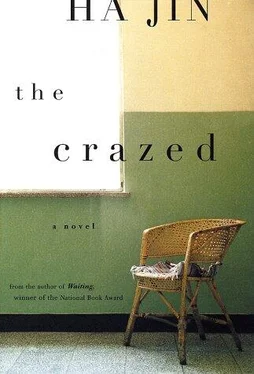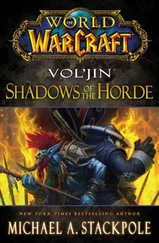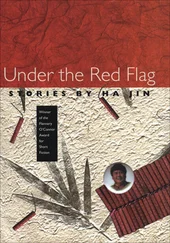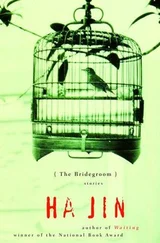A few guards, hired from the local militia, stopped us and said we were allowed to watch the shooting only from a distance of thirty yards. So we had to stay where we were. In the meantime, a few members of the crew were assembling the villagers for a scene.
More than a hundred country people knelt down. Men, women, and children all were in straw sandals and ancient ragged clothes. A few shaggy men carried bedrolls slung over their shoulders. Beyond the villagers, about sixty yards up the slope, stood a two-wheeled carriage in which sat the figure of Heng Zhang, a tall, stately official. The sunlight lit up his ruddy face, glittering on the golden tassels hanging on his black hat.
A spare man with ratty gray whiskers and a mustard-colored cap, who must have been the director, shouted to the villagers, “If you don’t do it right this time, I won’t pay you. Understood?”
“Yes sir,” replied some voices.
He went behind a lop-eared young man kneeling on the ground and stepped on his calf. “Ouch!” the fellow cried, then gave a muffled moan.
“Don’t spread your legs like a crippled duck,” the director rapped out.
“I won’t, sir.”
Then the bigwig went over to an old man, who was skinny and hunchbacked. He grabbed a tuft of his white hair and shoved his head down, which hit the ground so hard that the man groaned and would have keeled over if he hadn’t put out his right hand to break his fall. The director ordered, “Let your head touch the dirt when you kowtow. Got it?”
“Yes sir.”
“Now ready?” The big boss turned around and saw Hao and me. He shouted, “Hey, you two over there, get away. Hide in the gully.”
The guards pushed us away while the short cameraman recognized me and gave me a military salute, though he was bareheaded.
Hiding in the ditch, Hao and I couldn’t help but poke out our heads to watch. The director instructed the villagers loudly, “This time you must all knock your heads on the ground and cry like your parents just died.” He raised his slim-fingered hand and called, “Ready?”
All the crew nodded.
“Action!”
The carriage, drawn by two white ponies that looked like twins, began rolling down the narrow trail. The four men walking beside it looked sweaty and exhausted, slightly staggering; one of them was carrying across his back a long sword with a red tassel. Down the slope the villagers kowtowed and cried in singsong voices, “Savior! Our Savior is descending!”
“Heaven has eyes!”
“Oh, we’re saved at last!”
“Our Lord, our great Lord is coming!”
In no time their cries grew chaotic, but they had really gotten into the drama. Some were swaying their heads from side to side as they found release in wailing. Many of them were shedding tears of joy as if the new arrival were the real Heng Zhang, a legendary savior expected by millions of downtrodden people for two thousand years. Following their parents, the children bawled and kowtowed too — they looked like chickens pecking at grain seeds. I was shocked by the emotion they had worked up. They were enacting their roles much more earnestly than the professionals. As if entranced, some of them were sobbing, some sniffling, and some moaning.
Heng Zhang rose a little in the carriage and clasped his hands before his chest, smiling and nodding at the people down the slope. He then stroked his long but scanty beard, as though his mind was full of wise plans. As the vehicle slowed to a stop, all the people sprang to their feet and ran up to him, carrying baskets of foods and fruits and gourds of wine and water.
“Cut!” the director shouted and flung up his hand. “This is the fourth time today, and still you haven’t done it right. I told you not to get up too soon. Why is this so difficult? I’ve never met people as stupid as you. What can I do with you? All right, get your money from her.” He pointed at a young woman in a white gob hat and sunglasses, then went on, “Go home now. Come back tomorrow morning at ten o’clock, and we’ll try again.”
The villagers, still dazed despite the interruption, began gathering around the woman, who was calling out their names and handing out cash.
After dusting ourselves off, Hao and I came out of the ditch. I asked him, “How much do they pay each person?”
“One yuan a day.”
“What?” I couldn’t believe my ears.
“One yuan a day, the same for the kids.”
My head started throbbing as I tried to control myself. Never had I thought these people could be so poor that for a pittance of one yuan they’d allow that director to do whatever he wanted with them. Some of them must never have seen a movie before and couldn’t possibly enjoy the prospect of having their faces shown on the screen. My heart was shaking, filled with pity, dismay, and disgust. Feeling queasy, I squatted down. Hao explained, “That’s good money for us, you know. I can’t get the money myself because my dad and daughter are already there. Each family is allowed only two members in this business. Folks like us rarely have a chance to make one yuan a day. You have to sell five eggs to get that much.”
Not wanting him to see my emotion, I buried my face in my palms while breathing heavily, my elbows resting on my knees. I remained this way for over a minute.
A group of teenage girls emerged from the valley, each carrying two buckets of water on a curved shoulder pole. Their loads were crushing, and they hurried down the trail unsteadily. As I wondered how this would fit in the movie, one of them lost her balance. With a clack she fell on her behind, and her buckets clanked all the way down until they hit a huge rock. She broke into a woeful cry. A young man rushed over to help her up, but she refused to budge. Her face was smeared with dust, sweat, and tears; she was wailing shamelessly with her mouth wide open like a frog. The other girls stopped and put down their loads, but they seemed too exhausted to respond to her crying. They were just watching.
“Get away!” the director shouted. He held up the camera, busy shooting. Two guards pushed the people aside. The man went on filming the crying girl, whose eyes were shut and whose voice was croaky. She even kicked her heels on the wet spot, the soles of her rubber sneakers caked with mud.
“This is it, great!” the director said rapturously, working the camera with his left eye closed.
“My dad will whack me again!” the girl shrieked. “Oh, it’s too late to go back and fetch another load.”
A square-faced girl yelled at her, “Shut up! Shame on you. I’ll give you a bucket. Get up now.”
“She’s new. Everybody’s like this in the beginning,” a female voice whispered behind me. I watched but couldn’t make sense of this scene.
Finally the girl stopped wailing. The director turned off the camera and handed it back to the short fellow. “This is real stuff,” he said, beaming with his snaggleteeth flashing. Then he turned to the villagers. “You all saw it. Tomorrow when I say ‘Action,’ you must cry like her. Got it?”
Nobody answered.
The girl was helped to her feet. She picked up her shoulder pole and buckets, which somebody had recovered for her, and began leaving with the other girls. As she was passing the director, he took out a two-yuan bill from his wallet and gave it to her. She accepted the money without a word. Meanwhile, the film crew was packing to move to another spot deep in the valley. A cleated plank slanted up to the rear of their truck.
I figured they must have arranged the last scene, so I asked Hao, “Did they hire those girls too?”
“Nope. Can’t you see that the girl hurt for real?”
“Why was she so mad over two buckets of water?”
“Why so mad?” He sounded a little crazy too, his eyes ablaze. “She carried the whole load from Sweet Fount Village three miles away. When she had almost reached home, the water was suddenly all lost. Why so mad? Her folks were waiting for the water to cook supper with. She was too tired and it was too late to go back to fetch another two buckets. Her dad is going to beat and cuss her this evening and the whole village will hear him. Don’t you see now, why so mad?”
Читать дальше

![Lao Zi - Dao De Jing [Tao Te Ching] (english)](/books/3890/lao-zi-dao-de-jing-tao-te-ching-english-thumb.webp)
![Lao Zi - Dao De Jing [Tao Te Ching] (chinese)](/books/3891/lao-zi-dao-de-jing-tao-te-ching-chinese-thumb.webp)
![Lao Zi - Dao De Jing [Tao Te Ching] (espanol)](/books/3892/lao-zi-dao-de-jing-tao-te-ching-espanol-thumb.webp)







